BRYCE ON POLITICS
- What should his speech include?
(Click for
AUDIO VERSION)
To use this segment in a Radio broadcast or Podcast, send TIM a request.
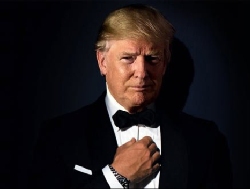
Presidential inaugural speeches are typically used to provide a sense of the character of the president and what he hopes to accomplish in his upcoming term of office. It also affords the president an opportunity to provide a sense of what our priorities and values should be. As we have just survived a brutal election campaign, Donald Trump's speech will be incredibly important to heal the nation and help us move forward. There will be those who will dismiss his comments out of hand, but even they should listen carefully to what he has to say before criticizing him.
I have listened and read many inaugural addresses over the years, some are obviously better than others, and quite often there is some commonality between them, such as calling for the people to renew their efforts and support the nation.
If I were to write Mr. Trump's address, I would consider including the following subject areas and how past presidents addressed them.
A CALL FOR MORALITY
It is important to review and restore our sense of right and wrong. To this end Dwight Eisenhower found a clever way to express his sense of morality in his first inaugural address (January 20, 1953) by opening with the following:
"My friends, before I begin the expression of those thoughts that I deem appropriate to this moment, would you permit me the privilege of uttering a little private prayer of my own. And I ask that you bow your heads:
Almighty God, as we stand here at this moment my future associates in the Executive branch of Government join me in beseeching that Thou will make full and complete our dedication to the service of the people in this throng, and their fellow citizens everywhere.
Give us, we pray, the power to discern clearly right from wrong, and allow all our words and actions to be governed thereby, and by the laws of this land. Especially we pray that our concern shall be for all the people regardless of station, race or calling.
May cooperation be permitted and be the mutual aim of those who, under the concepts of our Constitution, hold to differing political faiths; so that all may work for the good of our beloved country and Thy glory. Amen."
UNITING THE COUNTRY
America is deeply divided today due to political ideologue, resulting in culture clashes and riots. Although an inaugural address cannot singularly solve such a problem, it can help set the tone for uniting the country.
Probably nobody knew the pain of a divided country better than Abraham Lincoln. In 1858, before assuming the presidency, he gave his famous "House Divided" speech at the Illinois State Capitol in Springfield, warning of the dangers of division, but it was his second inaugural address (March 4, 1865) where he began to call for unity and forgiveness near the conclusion of the Civil War:
"With malice toward none; with charity for all; with firmness in the right, as God gives us to see the right, let us strive on to finish the work we are in; to bind up the nation's wounds; to care for him who shall have borne the battle, and for his widow, and his orphan--to do all which may achieve and cherish a just and lasting peace, among ourselves, and with all nations."
THE DIGNITY OF THE COMMON MAN
Theodore Roosevelt's "Square Deal" speech, delivered at a banquet in Dallas, Texas (April 5, 1905), referred to the dignity of the common man and, as such, his rights as an America citizen:
"We must act upon the motto of all for each and each for all. There must be ever present in our minds the fundamental truth that in a republic such as ours the only safety is to stand neither for nor against any man because he is rich or because he is poor, because he is engaged in one occupation or another, because he works with his brains or because he works with his hands. We must treat each man on his worth and merits as a man. We must see that each is given a square deal, because he is entitled to no more and should receive no less."
A CALL FOR HOPE AND OPTIMISM
So far, the 21st century has proven to be a difficult time for all Americans, be it as a result of 9-11, the economic recession, and social upheaval. As such, it is necessary to lift up the spirits of the citizens, and offer them a glimmer of hope.
Following cousin Teddy's "Square Deal," Franklin Roosevelt wanted to lift the hopes of Americans suffering from the Great Depression with a "New Deal." In July 11, 1932, TIME magazine quoted him as saying:
"Throughout the nation men and women, forgotten in the political philosophy of the Government, look to us here for guidance and for more equitable opportunity to share in the distribution of national wealth... I pledge myself to a new deal for the American people. This is more than a political campaign. It is a call to arms."
In Ronald Reagan's second inaugural address (January 21, 1985), he admonished Americans:
"My fellow citizens, our Nation is poised for greatness. We must do what we know is right and do it with all our might. Let history say of us, "These were golden years-when the American Revolution was reborn, when freedom gained new life, when America reached for her best."
President Calvin Coolidge made the observation:
"Nothing in this world can take the place of persistence. Talent will not: nothing is more common than unsuccessful men with talent. Genius will not; unrewarded genius is almost a proverb. Education will not: the world is full of educated derelicts. Persistence and determination alone are omnipotent."
THE NEED FOR RESPONSIBLE CITIZENSHIP
The need for responsible citizens is an important attribute for any country to promote moral values, patriotism, and to improve society.
In his first inaugural address (January 20, 2001), George W. Bush observed:
"What you do is as important as anything government does. I ask you to seek a common good beyond your comfort; to defend needed reforms against easy attacks; to serve your nation, beginning with your neighbor. I ask you to be citizens: citizens, not spectators; citizens, not subjects; responsible citizens, building communities of service and a nation of character.
Americans are generous and strong and decent, not because we believe in ourselves, but because we hold beliefs beyond ourselves. When this spirit of citizenship is missing, no government program can replace it. When this spirit is present, no wrong can stand against it."
A CALL FOR LAW AND ORDER
Today, we suffer from a lack of respect for law and order. Law Enforcement officers have been assaulted and assassinated, and we have experienced massive demonstrations, with very few being peaceful in intent.
At an address at the Minnesota State Fair in St. Paul, MN (September 2, 1901), Theodore Roosevelt said:
"The first essential of civilization is law. Anarchy is simply the handmaiden and forerunner of tyranny and despotism. Law and order enforced with justice and by strength lie at the foundations of civilization. Law must be based upon justice, else it cannot stand, and it must be enforced with resolute firmness, because weakness in enforcing it means in the end that there is no justice and no law, nothing but the rule of disorderly and unscrupulous strength. Without the habit of orderly obedience to the law, without the stern enforcement of the laws at the expense of those who defiantly resist them, there can be no possible progress, moral or material, in civilization. There can be no weakening of the law-abiding spirit here at home, if we are permanently to succeed; and just as little can we afford to show weakness abroad."
EXTENDING AN OLIVE BRANCH TO ALL COUNTRIES
America is now accused of "leading from behind," thereby losing respect in the world community. It is necessary for America to again be looked upon as a force to be reckoned with.
At John Kennedy's inauguration (January 20, 1961), he explained his foreign policy:
"Let every nation know, whether it wishes us well or ill, that we shall pay any price, bear any burden, meet any hardship, support any friend, oppose any foe to assure the survival and the success of liberty.
This much we pledge--and more.
To those old allies whose cultural and spiritual origins we share, we pledge the loyalty of faithful friends.
Finally, to those nations who would make themselves our adversary, we offer not a pledge but a request: that both sides begin anew the quest for peace, before the dark powers of destruction unleashed by science engulf all humanity in planned or accidental self-destruction.
We dare not tempt them with weakness. For only when our arms are sufficient beyond doubt can we be certain beyond doubt that they will never be employed."
WHERE WE SHOULD BE GOING
Americans value leadership as they like to know where the country is headed.
To illustrate, it was John Kennedy who called for a renewed effort of America's space program and putting a man on the moon before the end of the decade. His talk was delivered at Rice University in Houston, Texas (September 12, 1962).
"But why, some say, the Moon? Why choose this as our goal? And they may well ask, why climb the highest mountain? Why, 35 years ago, fly the Atlantic? ...
We choose to go to the Moon! ... We choose to go to the Moon in this decade and do the other things, not because they are easy, but because they are hard; because that goal will serve to organize and measure the best of our energies and skills, because that challenge is one that we are willing to accept, one we are unwilling to postpone, and one we intend to win ..."
This speech reflected vision and inspired the people, helping to make the 1960's an era of possibilities.
Such eloquent rhetoric will be impossible to replicate in a single speech, but if Trump can effectively touch on each of these subject areas, the country will become more confident and possibly less divisive. His objective should be to inspire the nation and motivate the citizens to work together cooperatively, morally, and responsibly.
Whether you love him or hate him, you can ill-afford not to listen to his inaugural address. Stay tuned for January 20th, when we will learn how to "Make America Great Again."
Keep the Faith!
Note: All trademarks both marked and unmarked belong to their respective companies.
Copyright © 2017 by Tim Bryce. All rights reserved.
NEXT UP: WHAT I LEARNED ABOUT THE PRESS - Dealing with an irresponsible press.
Listen to Tim on
News Talk Florida (WWBA 820 AM),
WZIG-FM (104.1) in Palm Harbor,FL;
KIT-AM (1280) in Yakima, Washington
"The Morning News" with hosts Dave Ettl & Lance Tormey (weekdays. 6:00-9:00am Pacific). Or tune-in to Tim's channel on
YouTube.
 It was recently announced the legendary Ringling Brothers and Barnum & Bailey Circus, "The Greatest Show
on Earth," would be closing in May 2017. To fans of the circus, the news was devastating as it had become an institution after 145 years of operation. Like so many families, I took my children to see the circus at a young age. They were fascinated by the trained elephants, tigers, horses, and various other animal acts. The trapeze performers and high-wire acts were also a favorite.
It was recently announced the legendary Ringling Brothers and Barnum & Bailey Circus, "The Greatest Show
on Earth," would be closing in May 2017. To fans of the circus, the news was devastating as it had become an institution after 145 years of operation. Like so many families, I took my children to see the circus at a young age. They were fascinated by the trained elephants, tigers, horses, and various other animal acts. The trapeze performers and high-wire acts were also a favorite. Tim Bryce is a writer and the Managing Director of M&JB Investment Company (M&JB) of Palm Harbor, Florida and has over 40 years of experience in the management consulting field. He can be reached at timb001@phmainstreet.com
Tim Bryce is a writer and the Managing Director of M&JB Investment Company (M&JB) of Palm Harbor, Florida and has over 40 years of experience in the management consulting field. He can be reached at timb001@phmainstreet.com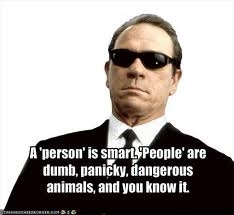 Telling the truth has gotten me into a lot of trouble on more than one occasion over the years, both personally and professionally. So much so that I have come to the conclusion that people plain and simply don't want to know it. For starters, it's hard to know when someone is telling the truth. A lot depends on the integrity of the person telling us something, coupled with our ability to apply logic. Erroneous results occur when we are being misled and don't use our heads which is why people act more on perceptions as opposed to reality (which is what politicians running for office count on).
Telling the truth has gotten me into a lot of trouble on more than one occasion over the years, both personally and professionally. So much so that I have come to the conclusion that people plain and simply don't want to know it. For starters, it's hard to know when someone is telling the truth. A lot depends on the integrity of the person telling us something, coupled with our ability to apply logic. Erroneous results occur when we are being misled and don't use our heads which is why people act more on perceptions as opposed to reality (which is what politicians running for office count on).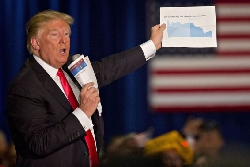 During President-Elect Trump's news conference held January 11th in New York, he made the observation there is a new sense of business optimism in the country. He pointed at the news regarding Fiat Chrysler and Ford building new plants here in the United States as opposed to Mexico. News reports regarding companies such as Carrier, who will remain in Indiana, is also welcomed as are other reports of companies returning home.
During President-Elect Trump's news conference held January 11th in New York, he made the observation there is a new sense of business optimism in the country. He pointed at the news regarding Fiat Chrysler and Ford building new plants here in the United States as opposed to Mexico. News reports regarding companies such as Carrier, who will remain in Indiana, is also welcomed as are other reports of companies returning home. My company has been doing business in Japan since the mid-1970's. We have enjoyed the experience and have marveled at how Japanese businessmen act and think. For example, it is very important for the Japanese to reach a group consensus on major decisions (an inherent part of the concept of Theory Z). By doing so, they solicit the input from all of the workers before making a decision (a bottom-up type of approach). As an American, I found this to be radically different than the western world's top-down micromanagement approach. The Japanese approach may make for a longer sales cycle, but it simplifies implementation (after all, everyone has agreed to the decision).
My company has been doing business in Japan since the mid-1970's. We have enjoyed the experience and have marveled at how Japanese businessmen act and think. For example, it is very important for the Japanese to reach a group consensus on major decisions (an inherent part of the concept of Theory Z). By doing so, they solicit the input from all of the workers before making a decision (a bottom-up type of approach). As an American, I found this to be radically different than the western world's top-down micromanagement approach. The Japanese approach may make for a longer sales cycle, but it simplifies implementation (after all, everyone has agreed to the decision). In 2016 I attended three Trump rallies as a member of the press corps. Frankly, it was an eye opening experience for me. At the beginning of each rally, there was an Invocation and a Pledge of Allegiance to the flag. Few reporters stood up to observe either which I personally found embarrassing. I also noticed the printed press had their columns written before Mr. Trump took the podium. This caused me to question their objectivity as they were more interested in what they wrote as opposed to what Mr. Trump actually said.
In 2016 I attended three Trump rallies as a member of the press corps. Frankly, it was an eye opening experience for me. At the beginning of each rally, there was an Invocation and a Pledge of Allegiance to the flag. Few reporters stood up to observe either which I personally found embarrassing. I also noticed the printed press had their columns written before Mr. Trump took the podium. This caused me to question their objectivity as they were more interested in what they wrote as opposed to what Mr. Trump actually said. Presidential inaugural speeches are typically used to provide a sense of the character of the president and what he hopes to accomplish in his upcoming term of office. It also affords the president an opportunity to provide a sense of what our priorities and values should be. As we have just survived a brutal election campaign, Donald Trump's speech will be incredibly important to heal the nation and help us move forward. There will be those who will dismiss his comments out of hand, but even they should listen carefully to what he has to say before criticizing him.
Presidential inaugural speeches are typically used to provide a sense of the character of the president and what he hopes to accomplish in his upcoming term of office. It also affords the president an opportunity to provide a sense of what our priorities and values should be. As we have just survived a brutal election campaign, Donald Trump's speech will be incredibly important to heal the nation and help us move forward. There will be those who will dismiss his comments out of hand, but even they should listen carefully to what he has to say before criticizing him. If you ever happen to see a craftsman at work, regardless of their field of endeavor, they are mindful of Michelangelo's axiom, "Trifles make perfection, and perfection is no trifle." This of course means perfection rarely occurs in quick and dirty situations. Instead, a methodical approach is preferred over trial and error, whereby careful consideration is given to all of the elements of planning, design, testing, and installation, where the development of each component in the product is carefully scrutinized for quality. In other words, perfection requires patience to achieve. We should, therefore, be mindful of the speed versus defect phenomenon, whereby the faster we go the more likely we are to experience defects in workmanship; the slower we go, the less likely.
If you ever happen to see a craftsman at work, regardless of their field of endeavor, they are mindful of Michelangelo's axiom, "Trifles make perfection, and perfection is no trifle." This of course means perfection rarely occurs in quick and dirty situations. Instead, a methodical approach is preferred over trial and error, whereby careful consideration is given to all of the elements of planning, design, testing, and installation, where the development of each component in the product is carefully scrutinized for quality. In other words, perfection requires patience to achieve. We should, therefore, be mindful of the speed versus defect phenomenon, whereby the faster we go the more likely we are to experience defects in workmanship; the slower we go, the less likely.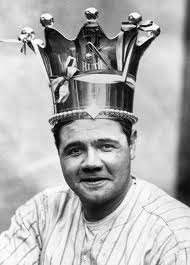 As charges of doping were brought against members of the US Bicycle Team, the investigation discovered the problem was much larger in scope than originally thought, not just here in America, but internationally as well. Americans should be familiar with the drug problem by now as just about every professional sport has had more than its share of incidents and scandal. Actually, we shouldn't be surprised by the rise of doping today as athletics are less about sports and more about business, big business.
As charges of doping were brought against members of the US Bicycle Team, the investigation discovered the problem was much larger in scope than originally thought, not just here in America, but internationally as well. Americans should be familiar with the drug problem by now as just about every professional sport has had more than its share of incidents and scandal. Actually, we shouldn't be surprised by the rise of doping today as athletics are less about sports and more about business, big business.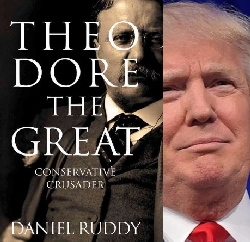 To understand the mind of our 45th President, Donald J. Trump, one need only go back approximately 100 years in American history and study the character of our 26th President, Theodore Roosevelt ("TR"), considered one of our greatest presidents of all time (see Mt. Rushmore). In author Daniel Ruddy's recent book,
To understand the mind of our 45th President, Donald J. Trump, one need only go back approximately 100 years in American history and study the character of our 26th President, Theodore Roosevelt ("TR"), considered one of our greatest presidents of all time (see Mt. Rushmore). In author Daniel Ruddy's recent book,  Back when we were headquartered in Cincinnati, our corporate attorney was the same person who represented some of the members of the legendary Big Red Machine, including Johnny Bench, the famous Hall-of-Fame catcher. My father got to know Johnny over the years through our attorney's holiday parties. Years later, after we moved to the Tampa Bay area, my father called our attorney on a day when Bench happened to be sitting in his office. Wanting to send his regards, my father asked to speak to Johnny on the phone and told him his grandson (my son) was playing catcher in Little League and asked Bench if he had any advice for him. He replied, "Yes, there are three things he must do; first, if you're the catcher, you must catch the ball at all costs, that is your job; Second, when you make a throw to another base, point your opposite foot in the direction of the base, it will help guide you in the proper direction, and; Third, always wear a cup." Although his last point was said in jest, it was not without merit. Over the years, as I coached several Little League teams, I always began my catcher clinic with this little anecdote. It was simple, humorous, and because it originated from someone highly respected in his trade, my players took it to heart.
Back when we were headquartered in Cincinnati, our corporate attorney was the same person who represented some of the members of the legendary Big Red Machine, including Johnny Bench, the famous Hall-of-Fame catcher. My father got to know Johnny over the years through our attorney's holiday parties. Years later, after we moved to the Tampa Bay area, my father called our attorney on a day when Bench happened to be sitting in his office. Wanting to send his regards, my father asked to speak to Johnny on the phone and told him his grandson (my son) was playing catcher in Little League and asked Bench if he had any advice for him. He replied, "Yes, there are three things he must do; first, if you're the catcher, you must catch the ball at all costs, that is your job; Second, when you make a throw to another base, point your opposite foot in the direction of the base, it will help guide you in the proper direction, and; Third, always wear a cup." Although his last point was said in jest, it was not without merit. Over the years, as I coached several Little League teams, I always began my catcher clinic with this little anecdote. It was simple, humorous, and because it originated from someone highly respected in his trade, my players took it to heart. My brother-in-law recently paid us a visit. He recently retired from General Electric, an old customer of ours, and we talked a little shop. He brought to my attention, a new vacation policy of G.E.'s whereby salaried employees can now take as much vacation time as they want, as long as it doesn't interfere with their project schedules. Like most companies, the scheduling of vacations used to be critical and you were typically rewarded vacation time based on your length of service to the company, e.g., one week after one year, two weeks after two years, etc. Evidently, it is not that way anymore.
My brother-in-law recently paid us a visit. He recently retired from General Electric, an old customer of ours, and we talked a little shop. He brought to my attention, a new vacation policy of G.E.'s whereby salaried employees can now take as much vacation time as they want, as long as it doesn't interfere with their project schedules. Like most companies, the scheduling of vacations used to be critical and you were typically rewarded vacation time based on your length of service to the company, e.g., one week after one year, two weeks after two years, etc. Evidently, it is not that way anymore.